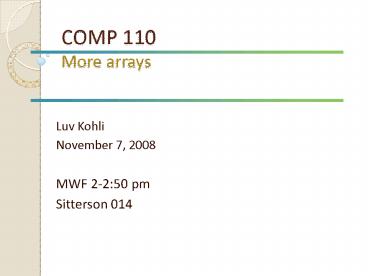COMP 110 More arrays - PowerPoint PPT Presentation
Title:
COMP 110 More arrays
Description:
Like a list of variables, but with a nice, compact way to name them ... Smiley[] smilies = new Smiley[3]; 14. 1045. 2584. 2836. true. GREEN. 3. false. BLUE. 1. false ... – PowerPoint PPT presentation
Number of Views:31
Avg rating:3.0/5.0
Title: COMP 110 More arrays
1
COMP 110More arrays
- Luv Kohli
- November 7, 2008
- MWF 2-250 pm
- Sitterson 014
2
Announcements
- Lab 6 due
- Lab 7 assigned today
- Final program, Program 4, assigned Monday
- Electronic Arts (EA) information session
- Tuesday, November 11, 6pm
- Sitterson Hall 011
- Free food!
- Free games!
3
Questions?
4
Today in COMP 110
- More about arrays
- Start Lab 7
5
Review Arrays
- An array is a collection of items of the same
type - Like a list of variables, but with a nice,
compact way to name them - A special kind of object in Java
6
Review Creating an array
- int scores new int5
- This is like declaring 5 strangely named
variables of type int - scores0
- scores1
- scores2
- scores3
- scores4
7
Review Indexing
- Variables such as scores0 and scores1 that
have an integer expression in square brackets are
known as - indexed variables, subscripted variables, array
elements, or simply elements - An index or subscript is an integer expression
inside the square brackets that indicates an
array element
8
Review Indexing
- Where have we seen the word index before?
- Strings indexOf method
- Index numbers start with 0. They do NOT start
with 1 or any other number.
9
Review Indexing
- The number inside square brackets can be any
integer expression - An integer scores3
- Variable of type int scoresindex
- Expression that evaluates to int scoresindex3
- Can use these strangely named variables just like
any other variables - scores3 68
- scores4 scores4 3 // just made a
3-pointer! - System.out.println(scores1)
10
Review Array
- The array itself is referred to by the name
scores (in this particular case)
Indices
0 1 2 3 4
68 73 57 102 94
the array scores
scores3
11
Review Arrays
- System.out.println("Enter 5 basketball scores")
- int scores new int5
- int scoreSum 0
- for (int i 0 i lt 5 i)
- scoresi keyboard.nextInt()
- scoreSum scoresi
- double average (double) scoreSum / 5
- System.out.println("Average score " average)
- for (int i 0 i lt 5 i)
- if (scoresi gt average)
- System.out.println(scoresi " above
average") - else if (scoresi lt average)
- System.out.println(scoresi " below
average") - else
12
Review for-each
- You can also use another form of the for loop
with collections (such as arrays) - for (int s scores)
- if (s gt average)
- System.out.println(s " above
average") - else if (s lt average)
- System.out.println(s " below
average") - else
- System.out.println(s " equal to the
average") - s takes on the value of each element of the array
score, but you cannot change an elements value
this way
13
Arrays as instance variables
- public class Weather
- private double temperature
- private double pressure
- public void initializeTemperature(int len)
- temperature new doublelen
14
Arrays of objects
- Smiley smilies new Smiley3
1045 2584 2836
true
GREEN
3
false
BLUE
1
false
CYAN
4
15
Arrays as arguments
- public void changeArray(int arr)
- int len arr.length
- arrlen 1 25
23 47 52 14 7
25
16
Arrays as return types
- public double buildArray(int len)
- double retArray new doublelen
- for (int i 0 i lt retArray.length i)
- retArrayi i 1.5
- return retArray
17
Introduction to sorting
- Given an array of numbers, sort the numbers into
ascending order - Input array
- Sorted array
4 7 3 9 6 2 8
2 3 4 6 7 8 9
18
Selection sort pseudocode
- for (index 0 index lt length index)
- Find index of smallest value of array
- between index and end of array
- Swap values of current index and the
- index with the smallest value
19
Selection sort
4 7 3 9 6 2 8
2 7 3 9 6 4 8
2 3 7 9 6 4 8
20
Bubble sort
- Repeat until array is sorted
4 5 7 2 3 9 8
4 7 5 9 2 3 8
4 5 7 9 2 3 8
4 5 7 2 3 8 9
4 5 7 2 9 3 8
21
Lab 7
22
Monday
- More arrays































